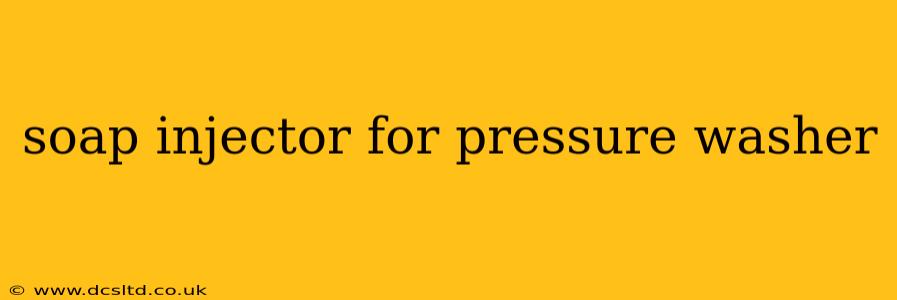Pressure washing is a powerful cleaning method, but adding soap significantly enhances its effectiveness. A soap injector is the key to efficiently mixing and dispensing detergent into your pressure washer's water stream, resulting in a cleaner, more thorough wash. This comprehensive guide will delve into everything you need to know about soap injectors for pressure washers, helping you choose the right one for your needs.
What is a Soap Injector for a Pressure Washer?
A soap injector is a device that draws detergent from a container and injects it into the high-pressure water stream produced by your pressure washer. They vary in design and functionality, ranging from simple suction systems to more complex, regulated models. The primary benefit is consistent soap dispensing, preventing inconsistent cleaning and avoiding the need for manual mixing.
How Does a Soap Injector Work?
Most soap injectors utilize a venturi effect. This effect relies on the high-velocity water flow to create a vacuum, drawing soap from a reservoir into the water stream. The precise ratio of soap to water is determined by the injector's design and the size of the siphon tube. Some higher-end models offer adjustable settings for precise soap concentration control.
Different Types of Soap Injectors
Several types of soap injectors are available, each suited for different pressure washer setups and user needs:
1. Suction-Type Injectors:
These are the most common type, simple to install, and relatively inexpensive. They attach directly to your pressure washer's wand or pump, drawing soap from a container via suction. They are ideal for occasional users and smaller jobs.
2. Direct-Injection Injectors:
These injectors are usually permanently installed on the pressure washer itself. They often provide a more consistent and regulated soap flow compared to suction-type injectors.
3. Electric Injectors:
Electric injectors offer precise control over soap concentration and dispensing rate. They are often more expensive but provide superior performance, especially for professional use.
4. Chemical Injectors:
These are designed for injecting specific chemicals or detergents, often used for more specialized cleaning tasks.
Choosing the Right Soap Injector: What to Consider
Several factors influence the selection of a suitable soap injector:
- Pressure Washer Type: The compatibility with your pressure washer's GPM (gallons per minute) and PSI (pounds per square inch) is crucial. Always check the manufacturer's specifications.
- Soap Type: Some injectors are specifically designed for certain types of detergents, such as thick or thin solutions.
- Frequency of Use: If you're a professional, a robust and adjustable injector might be worthwhile; for occasional use, a basic suction-type injector will suffice.
- Budget: Prices range significantly, from inexpensive suction-type models to more costly, feature-rich options.
How to Install a Soap Injector
Installation procedures vary depending on the injector type. Consult the manufacturer's instructions for detailed guidance. Generally, it involves connecting the injector to the pressure washer's water line and connecting a separate line to your soap container.
Maintaining Your Soap Injector
Regular maintenance prolongs the lifespan of your soap injector and ensures consistent performance. This usually includes:
- Cleaning the injector: Regularly flush the injector with clean water to remove any soap residue that may clog it.
- Checking for leaks: Inspect the connections regularly to ensure they're tight and there are no leaks.
Troubleshooting Common Soap Injector Problems
- No soap dispensing: Check the siphon tube, ensure the soap container is filled, and verify that all connections are secure.
- Inconsistent soap flow: Check for clogs in the injector and ensure the soap is properly mixed.
- Leaking connections: Tighten loose connections or replace worn-out parts.
By understanding the different types, features, and maintenance requirements of soap injectors for pressure washers, you can make an informed decision and significantly enhance your pressure washing experience. Remember to always consult your pressure washer’s manual to ensure compatibility and follow all safety precautions.
